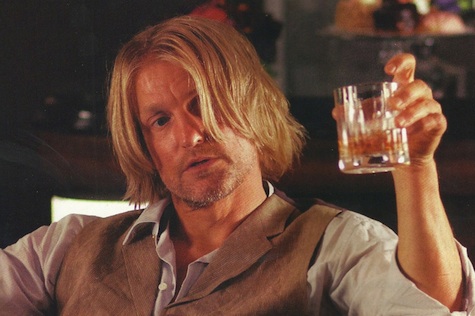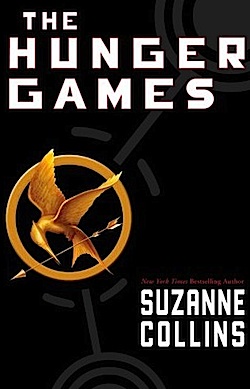Death-defying heroics in any adventure story is huge part of why we love popular fiction. Stories in which characters are literally or figuratively hanging off cliffs are fun because they make us turn the pages with half-fear and half-delight. The first Hunger Games novel is gripping because it’s both relatable and fantastic; she and her fellow tributes are almost super-powered in their agility and scrappy survival skills.
Personally, I wouldn’t have lasted two seconds in The Hunger Games and would have likely died at the cornucopia. And I bet most people would have, too. But this is a story, and a good adventure story asks you to make several leaps of logic. Luckily, if The Hunger Games lack believability, it manages to get away with it through old-fashioned heroics.
In Genre in the Mainstream last week, I talked about the literary tricks the book employs, specifically the notion of the first person present tense. While I think this has a lot to do with why the novel is so engaging, the book also makes use of genre-fiction hero-story pacing. I bet literary novels with a similar story would have spent more time establishing Katniss’s life in District 12, certainly a lot longer than having the selection of the tributes practically open the novel. Instead, the only sort of real-time pre-games action is Katniss hanging out in the woods with Gale while hunting. From this point on, the plot gets moving almost immediately and any backstory, including Katniss’s prior interactions with Peeta, memories of her family, memories of Gale and memories of previous Hunger Games, are dealt with as the present action occurs.
Within the first chapter, the reader is quickly familiarized with the reason The Hunger Games exist. A long time ago, the districts tried to rebel against the Capitol, and the Capitol beat them down. The Hunger Games are designed keep everyone in line. The Capitol says: give us your children, and watch them fight to the death, if you don’t, you’re cut off.
If you want to sit down and try to figure out how the economics and structure of this world actually works, be my guest. (I’m sure many have.) The book is so fast-paced you don’t really have time to think about it upon a first read. Before you know it, Katinss is volunteering to fight in the games in place of her younger sister Primrose, and in what feels like minutes of reading, she’s on the train bound for the Capitol where they’re going to get her ready for the big event.

Crammed into all this plot stuff, we get to know Haymitch, the only guy from District 12 who has ever won The Hunger Games. Making him a drunk is a great move, because he’s both unsympathetic and comical at the same time. How could this person be remotely helpful? He’ll be very helpful eventually, because that’s how a good adventure novel works. It sets up a premise, then subverts a little, but gives you want you want too.
The reader is then given a reprieve from worrying about Katniss dying The Hunger Games, as the designers and prep team get Katniss and Peeta ready for the opening ceremonies. Personally, I feel safe in these sections of the book because it introduces this pseudo-Alexander McQueen fashion sensibility into this future dystopia. We have now met the enemy and… all they want to do is make us look nice. The why behind the fashion and presentation is always present, but it’s hard to think about being groomed for a fight to the death when you’re surrounded by people worrying what shade of dress matches your skin tone. Here, Suzanne Collins bravely asserts that this stuff is just as much a part of society as war and politics. So, I’m comfortable here. But once the kids are all on their platforms, ready to make a dive for supplies and weapons, I’m totally terrified. What if it were me on the platform? What would I do? Personally, I’d probably start bawling my eyes out.
And that’s where the book comes to my rescue. Katniss doesn’t lose her shit right then. Instead, she’s a hero. She runs for the backpack, grabs it, and proceeds to spend the rest of the book meticulously planning her every move. If you ever want to feel like you’re disorganized about what you do in a given day, then read The Hunger Games. Not only are these kids really in-shape, and talented, they’ve also got awesome prioritization skills. Well, Katniss does anyway. Peeta doesn’t seem to think ahead as much, and when they’re eventually reunited, Katniss’s heroism turns to a little bit more of a caregiver role. This works for me only because not too much time is spent on this notion, and that she also isn’t just in love with Peeta for the sake of being in love with him.
Once the games begin, I, along with Katniss, started doing a death toll. I started “watching” The Hunger Games the same way someone in one of the districts would. Why do heroes get little confident smirks on their face with they’re about to do something brave? Maybe it’s because they know they have an audience, and in this fictional world, they do. Further, the notion of the audience has not only a meta-fictional layering, but a practical plot-function as well. The little silver parachutes necessary for survival come from the sponsors, who are in the audience. Almost nothing that happens then during the course of the games is without meaning or simply action for the sake of action. All of this stuff, from the mockingjays to the tracker jackers, to the little song sung by Rue have a good reason for being there. Everything comes back in small or big ways, and almost never exactly as you predicted it.
The novel does something deeply satisfying: it lets the hero do things you yourself might not have been able to do. It lets Katniss fight in the games instead of you, and so when you’re rooting for her, you’re making yourself feel better about not being selected in the reaping yourself.
Oh wait. What did you say? The Hunger Games isn’t real? Shhhh.
Ryan Britt is the staff writer for Tor.com.










